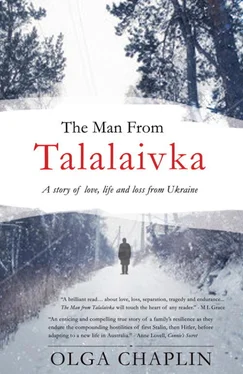* * *
The wind biting at his ears as he made his way on the familiar roadway back to the kolkhoz farmhouse, Peter tugged at his jacket collar and let out a deep sigh. He smiled to himself. At last he could contemplate his home-coming. In a moment of emotional release, he even teased himself with child’s names as he whispered a little kaska from earlier days, a simple rhythm that blended with his horse’s mud-clogged pace: “The home of my flower, The home of my youth, She always awaits me, My heart for her to soothe.”
At the bend in the roadway his horse shuddered, then jerked. Peter strained to look ahead for any obstacles, the afternoon light already casting deep blue shadows across the muddy way. He could see nothing untoward, and flicked the rein. Still, his horse neighed and raised its head, its mane tossing in warning. He steadied the horse and lowered himself, held the rein tight as he looked about towards the thicket. The deepening shadows cut surreal shapes, but something glinting caught his eye. He leaned closer towards the ditch hidden by the thicket.
Without warning, his back pricked with tension: there was someone tossed there, among the lower branches. He stood back a moment, trying to gauge the situation. He was unarmed, with only his horse as his means of transport, still kilometres from the kolkhoz farmhouse. And light would soon fade, the bitter autumn night treacherous in this unpredictable climate. But he could not leave this man there: the ditch was already water-logged; the nightly rain would fill it to the muddy roadway.
He took a deep breath, pushed aside his disappointment that he would not reach Evdokia before night fell. He tightened the reins at the adjoining tree and clambered down the muddy incline, the pungent musty undergrowth confounding his senses. He could not understand how this German soldier could be here, on his own, not to have been missed by his senior or his unit. He felt for a pulse, put his ear to the face. There was still sign of life. He felt along the man’s torso, his head and neck. His leg was broken; he was unconscious, concussed.
Peter felt for a rifle, or gun, his stomach tightening as his fingers searched for a nozzle or trigger that might discharge at him. Somehow it was mislaid as he fell—from a horse, a wagon, or army truck. This soldier may even have come by motorcycle, with a message. He tensed as he considered these possibilities and realised it was possible this could still be the work of partisan activity, before all opposition to the German takeover was eliminated, and that he, too, could be targeted for interfering with this German soldier.
He straightened a moment, dug his boots into the bushes for balance. It would be easy enough to leave the German soldier in this ditch. It was even possible his body would not be found for some time. But he was still alive, and could possibly survive if he received immediate help. On the other hand, if there was still partisan action in these parts, it was possible that their own kolkhoz could be unfairly implicated. Reprisals would automatically follow.
But over-riding the fear of these consequences, he felt pity for this man who could only be saved with fast, direct intervention. Whatever his personal views may be of this injured soldier of Hitler’s army, the man, too, had kin who cared for him, waited for him to return to them. Peter swallowed, salty lips and muddy water beads reminding him that he, too, was parched, exhausted. He braced himself. He could not in conscience abrogate the responsibility to help a wounded man who had not, to his knowledge, tried to injure him or his family.
He grabbed a few soft branches, placed them under the flagging leg, secured it with the soldier’s belt, and manoeuvred him out of the ditch. There was little choice: all medical help was back at Talalaivka. With almost his last breath he hauled the man over his horse, positioned astride, at its neck, braced himself behind him and reined his horse back to Talalaivka. The doctors, the medications, were there. He could do no more than this. He knew he would not need to look back over his own shoulder, to question his conscience or to remind himself one day that he would have let not only himself down, but humanity as well. With all else taken from them—dignity, pride, self-determination—it was the only credo which he and his compatriots had left to keep.
It would have to serve them well, and long, for the duration of Hitler’s occupation of their Ukraine.

Chapter 23
September 1943
Heart pounding uncontrollably, Peter jumped off his horse and threw open the farmhouse door. “Dyna, dite, ve doma?” An elder, startled, shook his head and pointed. Evdokia and the children were not yet back from the fields. Nor was Vanya. His heart sank as he tried to contain his feelings of foreboding of events about to be played out in their region. He must find Vanya, protect him from imminent danger. Everything had changed so rapidly these past few weeks. To their north Konotop, the German army’s last remaining supply line for its control over this area, had just fallen. Talalaivka, north-west of Romny, was only just holding its grip for the German army’s evacuation and retreat westward.
The German commandant knew this. Almost too late, he had received his evacuation orders from Hitler’s Army High Command, the OKH, which was still in disbelief and still unwilling to concede defeat in this region. Peter, in his punishingly long veterinary rounds, saw preparations for evacuation already taking place. He winced, now, as he thought of the choices given them, to his Ukrainian compatriots, as their military and political masters were about to change their iron fist batons again. He did not need to speculate far to see what lay ahead of them. News of German evacuation and retreats had been propagandised through Stalin’s henchmen, exaggeratedly, but realistically, pointing out the atrocities of the German Hun as he left their lands.
German military confidence had been dealt a huge blow in this summer of 1943. The Red Army, like an unquenchable monolithic giant girded to avenge these past two years, cut a massive military swathe with its new scythe of impenetrable armour to win back every kilometre of Stalin’s lost territory. Despite horrific loss of life, the Red Army was now unstoppable. It had buried forever Hitler’s hopes of conquering Moscow, had fought to the death to win back Stalingrad, symbol of both totalitarian goliaths’ might, and it had crippled Hitler and Goering’s Luftwaffe in the sacrificial battle for Kursk. Orel had fallen next to this almost obsessed Russian war machine, intent on making good Stalin’s promise to push Hitler’s armies back to western Europe. Then Kharkov, Ukraine’s eastern city, now back in Russian hands. German military strongholds in these vital areas were now gone, their life-pumping supply lines permanently cut. The small railway junction from Talalaivka was the German army’s only remaining hope for a hasty retreat from this area. Peter knew this. The German commandant’s orders for him to inspect the remaining horses for transport, confirmed this.
He ran to the fields, heart pounding recklessly. Evdokia, still tending to the solitary kolkhoz milking cow, looked up at her husband in relief, received his kiss on her dishevelled forehead. Little Mykola and tiny Nadia ran to him through spiky stubs, the harvested wheat having long completed its journey west to feed Hitler’s war machine. Soft early September light surreptitiously seeped away, transforming the wheat stubs into a myriad of bullet-like spears across the fields. The sun’s elusive rays had long gone. Ominous shadows spread over the countryside, over the dreaded woods and hill at the extremity of their kolkhoz fields.
Читать дальше













